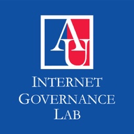Dr. Cogburn presents work from his new book “Transnational Advocacy Networks in the Information Society: Partners or Pawns?”
By Kenneth Merrill
In 2016 global governance of the Internet took a major step forward with the transition of the so-called IANA functions (the management of the authoritative mapping of domain names and IP address numbers) from US government oversight to a new multistakeholder arrangement housed under the International Corporation for Assigned Names and Numbers (ICANN). The product of decades of negotiations and planning by an array of stakeholders from government, industry, and civil society, the IANA transition proceeded even as new organizational forms and ICTs emerged to disrupt the established technosocial order, both within and outside these institutions of Internet governance like ICANN, the Internet Governance Forum (IGF), and the Internet Engineering Task Force (IETF), among others. Interrogating the impact of these new organizational forms on multistakeholder approaches to Internet governance, AU School of International Service professor (and Internet Governance Lab co-director) Dr. Derrick Cogburn’s new book titled, Transnational Advocacy Networks in the Information Society: Partners or Pawns?, provides a timely contribution to an increasingly important field of study.
On Monday the Internet Governance Lab co-hosted a book launch celebrating Dr. Cogburn’s new book and discussing some of the important questions it raises for the future of multistakeholder Internet governance. Following introductory remarks from AU School of International Service Dean Dr. James Goldgeier and AU School of Communication professor and Internet Governance Lab director Dr. Laura DeNardis, the event proceeded with a panel discussion led by Ambassador Diana Lady Dougan, Senior Advisor at the Center for Strategic and International Studies (CSIS) and former Assistant Secretary of State at the US Department of State.
Panel participants included Fiona Alexander, Associate Administrator in the Office of International Affairs at the National Telecommunications and Information Administration (NTIA), Mike Nelson of the content delivery network and internet service provider CloudFlare, Andrea Glorioso, Digital Economy and Cyber Counselor with the E.U. Delegation to the U.S., Marc Rotenberg, President and Executive Director of the Electronic Privacy Information Center (EPIC), and Larry Irving, President and CEO of the Irving Information Group.
Among the topics discussed were the role of civil society groups and transnational advocacy networks (TANs) in shaping the multistakeholder governance process and the IANA transition, differing approaches to Internet governance and information policy across various jurisdictional contexts (e.g. competing approaches to privacy taken by the EU and the US), and the role of the private sector (especially tech firms) in contributing to bottom-up governance of the Internet.
Nearly twenty years after political scientists Margaret Keck and Kathryn Sikkink developed the concept of transnational activist networks (TANs) and their role in global political movements like anti-war, anti-globalization, and the environmental movement, professor Cogburn’s book provides a timely adaption of the concept, using it to contextualize an increasingly important array of civil society and non-state actors and their impact on the field of Internet governance.
Watch the entire discussion here.

